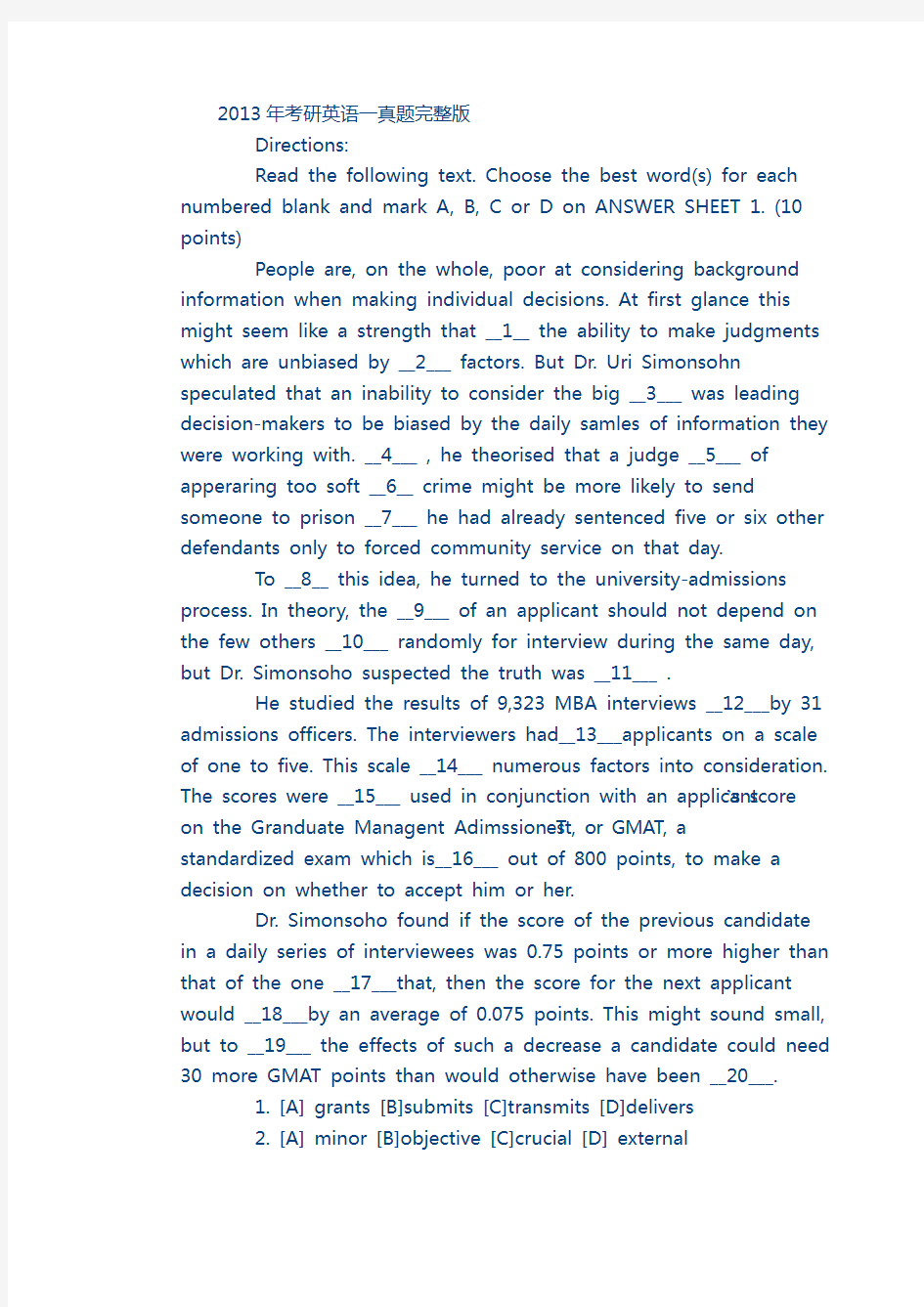2013年考研英语一真题完整版


2013年考研英语一真题完整版
Directions:
Read the following text. Choose the best word(s) for each numbered blank and mark A, B, C or D on ANSWER SHEET 1. (10 points) People are, on the whole, poor at considering background information when making individual decisions. At first glance this might seem like a strength that __1__ the ability to make judgments which are unbiased by __2___ factors. But Dr. Uri Simonsohn speculated that an inability to consider the big __3___ was leading
decision-makers to be biased by the daily samles of information they were working with. __4___ , he theorised that a judge __5___ of apperaring too soft __6__ crime might be more likely to send someone to prison __7___ he had already sentenced five or six other defendants only to forced community service on that day.
To __8__ this idea, he turned to the university-admissions process. In theory, the __9___ of an applicant should not depend on the few others __10___ randomly for interview during the same day, but Dr. Simonsoho suspected the truth was __11___ .
He studied the results of 9,323 MBA interviews __12___by 31 admissions officers. The interviewers had__13___applicants on a scale of one to five. This scale __14___ numerous factors into consideration. The scores were __15___ used in conjunction with an applicant’s score on the Granduate Managent Adimssion Test, or GMAT, a standardized exam which is__16___ out of 800 points, to make a decision on whether to accept him or her.
Dr. Simonsoho found if the score of the previous candidate in a daily series of interviewees was 0.75 points or more higher than that of the one __17___that, then the score for the next applicant would __18___by an average of 0.075 points. This might sound small, but to __19___ the effects of such a decrease a candidate could need 30 more GMAT points than would otherwise have been __20___.
1. [A] grants [B]submits [C]transmits [D]delivers
2. [A] minor [B]objective [C]crucial [D] external
3. [A] issue [B]vision [C]picture [D]external
4. [A] For example [B] On average [C]In principle [D]Above all
5. [A] fond [B] fearful [C]capable [D] thoughtless
6. [A] in [B] on [C] to [D] for
7. [A] if [B] until [C] though [D] unless
8. [A] promote [B] emphasize [C] share [D]success
9. [A] decision [B] quality [C] status [D] success
10. [A] chosen [B] studied [C] found [D] identified
11. [A] exceptional [B] defensible [C] replaceable [D] otherwise
12. [A] inspired [B] expressed [C] conducted [D] secured
13. [A] assigned [B] rated [C] matched [D] arranged
14. [A] put [B] got [C] gave [D] took
15. [A] instead [B] then [C] ever [D] rather
16. [A] selected [B] passed [C] marked [D] introduced
17. [A] before [B] after [C] above [D] below
18. [A] jump [B] float [C] drop [D] fluctuate
19. [A] achieve [B] undo [C] maintain [D] disregard
20. [A] promising [B] possible [C] necessary [D] helpful Section II Reading Comprehension
Part A
Directions:
Read the following four texts. Answer the questions below each text by choosing A, B, C or D. Mark your answers on ANSWER SHEET 1.
(40 points)
Text 1
In the 2006 film version of The Devil Wears Prada ,Miranda Priestly, played by Meryl Streep, scolds her unattractive assistant for imagining that high fashion doesn’t affect her, Priestly explains how the deep blue color of the assistant’s sweater descended over the years from fashion shows to departments stores and to the bargain bin in which the poor girl doubtless found her garment.
This top-down conception of the fashion business couldn’t be more out of date or at odds with the feverish would described in
